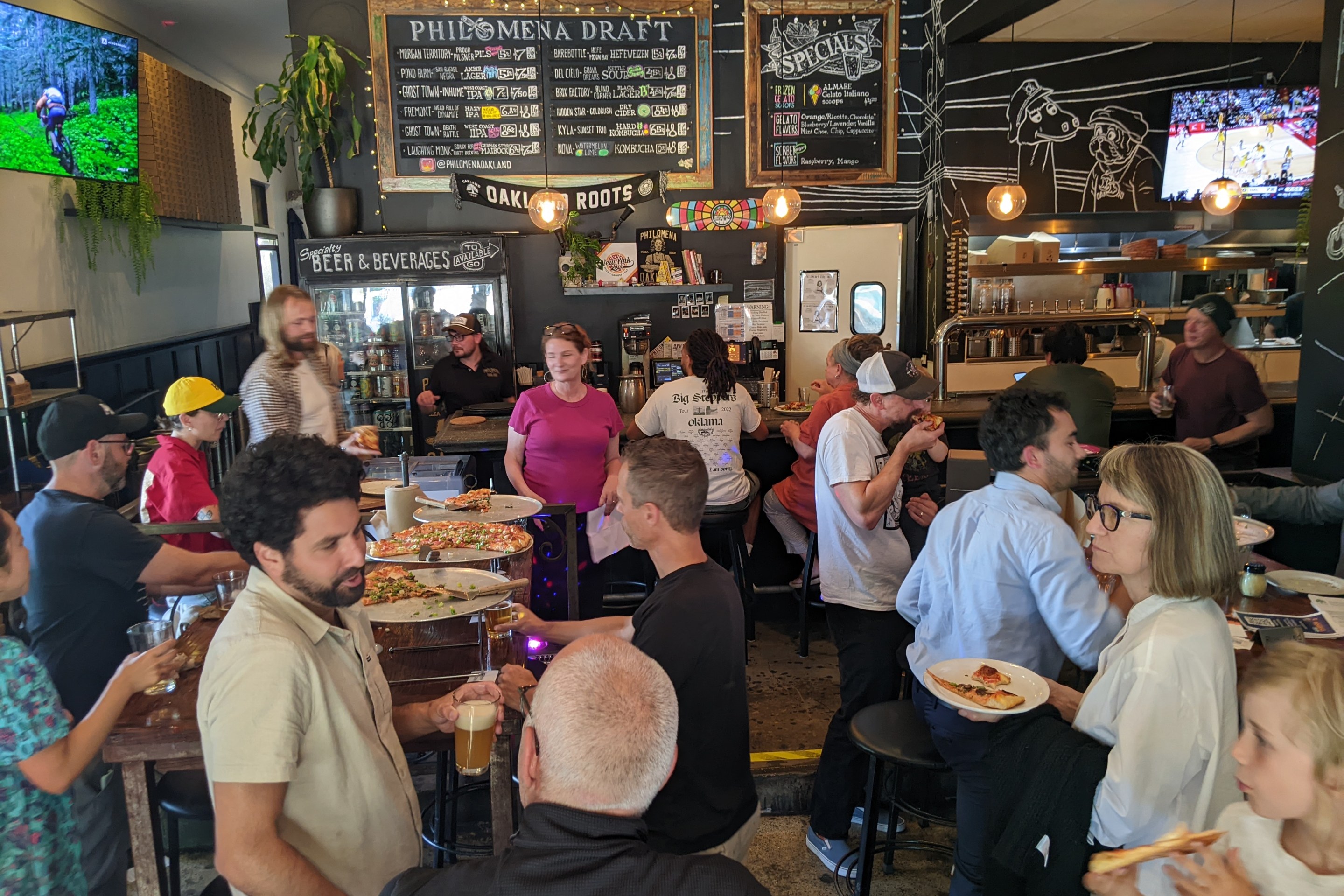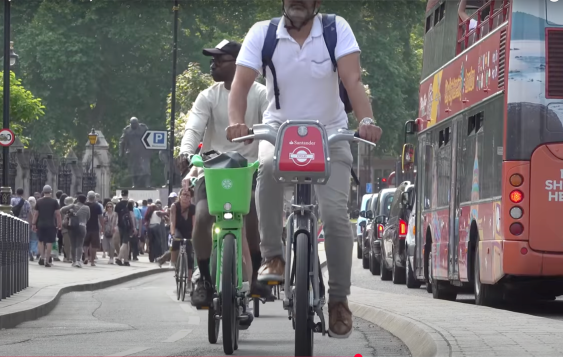 Jack Fleck, who retired yesterday after 25 years with the SFMTA, has been pondering the city's streets from his 7th floor office above Van Ness and Market Streets. Photos by Bryan Goebel.
Jack Fleck, who retired yesterday after 25 years with the SFMTA, has been pondering the city's streets from his 7th floor office above Van Ness and Market Streets. Photos by Bryan Goebel.Editor's note: This is the first of a three-part series on the past, present and future of traffic engineering in San Francisco.
Jack Lucero Fleck remembers his teenage years as a sputnik, the kind of kid who was as "nutty as a slide rule," loved math and science, and knew he was headed in that direction. It was the summer of 1965, and living in Peoria, Illinois, the same town where US DOT Secretary Ray LaHood grew up, Fleck couldn't quite peg what he wanted to do in life. And then there were the Watts riots.
"I got kind of interested in, 'well, what caused that? Why were people burning down their neighborhood?'," Fleck, 62, explained during a recent interview. "I decided I would go into civil engineering because I liked to do math and science and engineering and I would combine it with city planning to make cities better places to live, so people wouldn't want to burn them down."
For the last 25 years, Fleck, who retired yesterday from his job as San Francisco's top traffic engineer, has had a hand in almost every major transportation project in San Francisco, from the demolition and boulevard replacement of the Embarcadero and Central Freeways, to helping in the design of the T-Third line and Central Subway, to crafting a controversial proposal to remove the bike lane at Market and Octavia Streets.
He has sometimes been the bane of transit advocates for defending post-World War II traffic engineering orthodoxy favoring one-way street networks, such as those that roar through neighborhoods like the Tenderloin and SoMa. While some advocates have been working to dismantle some of the one-way arterials, Fleck, who became lead traffic engineer in 2004, is a firm believer in them. Still, those advocates and transportation professionals who have worked with Fleck (none we contacted would go on the record with their criticisms) say he has been a true professional and easy to work with.
"His views are very progressive and he's very environmentally conscious," said Bond Yee, the interim Director of Sustainable Streets at the SFMTA who has been at the agency four years longer than Fleck. "He epitomizes what the new generation of transportation professionals is becoming. He's a little bit ahead of his time."
Fleck had a lot to talk about during our 90 minute interview last week.
Some answers are revealing and offer insight into his thinking as a
traffic engineer who has been
entrenched in the design of our city streets for more than two decades.
 Fleck in his office at the SFMTA.
Fleck in his office at the SFMTA. Fleck himself admits he has a love/hate relationship with the automobile. "I grew up in such a way that I never questioned the automobile. Everybody in the 50s thought the automobile was king," said Fleck, who lives in Oakland and owns a car. "[But] as a student I started connecting all these problems with the automobile and the first one was related to the urban riots. At the time, the equal housing laws didn't exist so African Americans were pretty much confined to the inner city at the same time freeways were crisscrossing the cities and making them much less livable, destroying neighborhoods and creating noise and pollution."
Fleck said he learned the word livability from Don Appleyard while he was studying City Planning as a graduate student at U.C. Berkeley and it struck him "that that's what I wanted to do, make cities 'livable,' and I don't know that it was really a word that was used a lot until recently, but it does make sense."
Fleck's first job out of school was working on the Berkeley traffic diverters, and he got a stern lesson that traffic engineering doesn't always have to do with left or right politics.
"Some of the NIMBY types are pretty conservative, but then some of my friends on the left would surprise me that they would be pretty hostile to the diverters, you know? That they were people who were with the anti-war movement or whatever and they were just inflamed, 'oh the idea of those things in my way.' So I kind of realized that traffic is a funny issue, it's not exactly left and right and people get very emotional about it."
Fleck recalls, for example, the battle over tearing down the Embarcadero freeway after the 1989 earthquake, when lefty Terrence Hallinan (who went on to become the long-time district attorney before Kamala Harris), was among the supervisors who voted 6-5 to rebuild it. He was working for the Department of Public Works at the time.
"These freeways were taking land off the tax rolls. They weren't really making the city a better place or anything. So, it was great to see it go," said Fleck, who was engaged in a debate at the time about whether the traffic from the demolished freeway would live up to predictions of gridlock on city streets.
"The fact that all that traffic didn't go away, actually, helped us win the argument to say that they didn't need the freeway because the city streets were handling it all."
"Going back to my Berkeley experience I do feel there are
arterials that need to carry more traffic and then there are residential
areas that you want to protect. So I don't really support the idea
that the traffic should just be tossed out there widespread."
Fleck cites the demolition of both the Embarcadero and Central freeways as projects he was involved in that were some of his greatest accomplishments, but building the staff at the SFMTA, and changing the culture of the agency, is something he's most proud of.
"I think we've really looked at people who have backgrounds in both engineering and planning because they have that diverse sort of broader viewpoint," said Fleck." I think that we have people who really get it in terms of the Transit First policy and pedestrians and all the things we are trying to do here. I think in terms of a lasting legacy I would feel that that's more significant than anything."
"From the 50s, to now, almost 60 years, it's incredible to think back. There's only been five traffic engineers. And Jack's number five," said Yee, who was the longest serving traffic engineer before Fleck from 1990 to 2004.
Among the Transit First accomplishments Fleck listed in a slide presentation (PDF) at a recent SPUR luncheon are the city's 40 miles of bike lanes (bikes and pedestrians were added to the policy in 2000), 13 miles of transit lanes, transit signal priority at more than 100 intersections, pedestrian countdown signals at 800 intersections and a 30 percent reduction in injury collisions over the past 30 years. He also used this graph to point out that traffic fatalities have been on a steady decline.

"I kind of feel like this is in response to people who feel like traffic control devices actually are unsafe or less safe. I really don't subscribe to that. I think there is an argument to be made on big wide open intersections with low volume that it works pretty well without stop signs or anything because people have lots of visibility, and especially if you put traffic signals in, those can work."
Fleck attributes the decline to the three e's: engineering, education and enforcement, but thinks it's also the signals, the mast arms, the countdowns "and all those things that improve safety."
Fleck spent the first two days of his last week at the SFMTA attending the Western Institute of Transportation Engineers conference in San Francisco, where he made this presentation (PDF) with Yee titled, "What It Will Take to Stop Global Warming: The Case for Electric Cars." While he acknowledges that there is a danger electric cars could perpetuate sprawl and generate more auto-oriented development, Fleck sees them as key to fighting global warming.
"It's not the
ultimate total, everything solution, but I think given the danger of
global warming, and being underwater, it kind of makes everything else moot.
We can fight about all of the other things that we want to do, but if we
are under water it's not going to matter."
Fleck plans to continue working on global warming solutions, and hopes to improve his neighborhood in Oakland by encouraging "the political forces there to get solar panels on people's roofs and plug-in facilities in their driveways so people can have electric cars, and they won't be generating all this C02."
About leaving the SFMTA and the challenges ahead, Fleck was optimistic.
"I think we are in good hands. I really feel great about the staff and I feel like the organizational structure right now is very good," said Fleck. "I like the idea of introducing the word 'sustainability' into our name. I think traffic engineering has traditionally been safe and efficient movement of people and goods, which I support, but adding the word sustainable will also be a plus as we think to future generations and make sure that whatever we do now isn't damaging."
Next: Fleck shares his thoughts on Muni, Market Street, global warming and many other topics.




